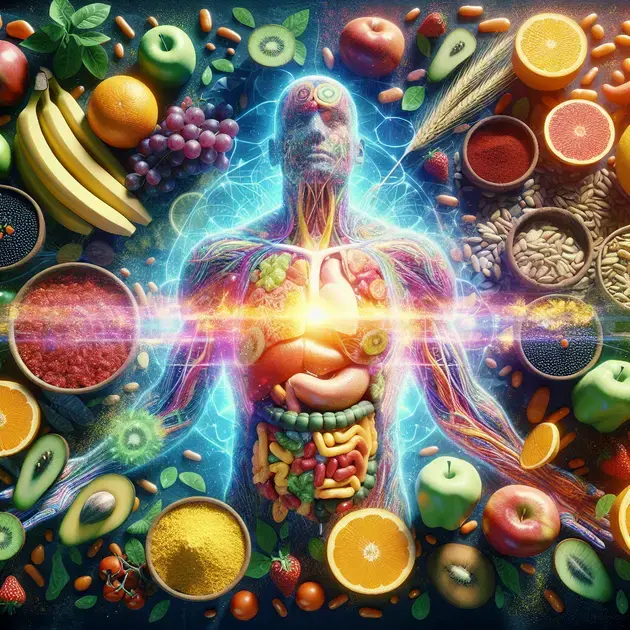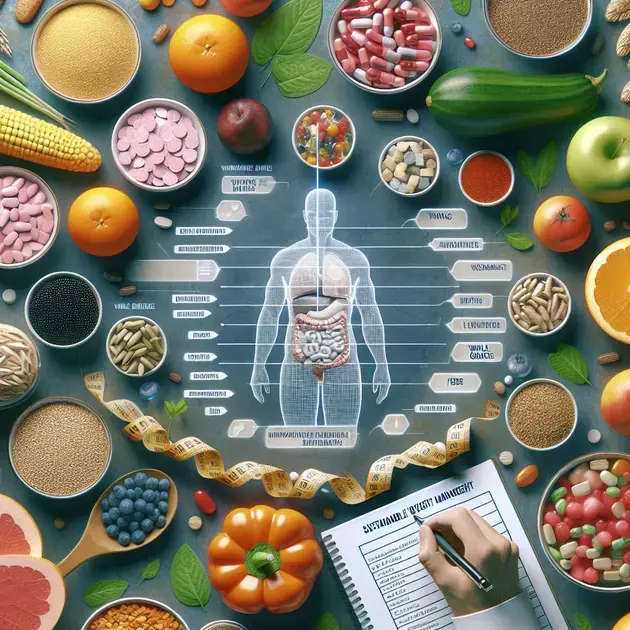When it comes to shedding extra pounds, incorporating vitamins that aid in weight loss into your daily routine can make a significant difference. These vitamins not only support your overall health but also assist in boosting your metabolism and increasing your body’s fat-burning abilities.
Research has shown that certain vitamins such as Vitamin D, Vitamin B12, and Vitamin C play key roles in promoting weight loss. By ensuring you have an adequate intake of these vitamins through your diet or supplementation, you can enhance your weight loss efforts and achieve your fitness goals more effectively.

Boosting Your Metabolism Naturally
Boosting your metabolism naturally is essential for maintaining a healthy weight and overall well-being. There are several effective ways to increase your metabolism without resorting to extreme measures or fad diets. One of the best ways to boost your metabolism naturally is by staying active throughout the day. Incorporating regular exercise into your routine, such as cardio, strength training, or yoga, can help increase your metabolic rate.
Another key factor in boosting your metabolism naturally is by getting an adequate amount of sleep each night. Studies have shown that lack of sleep can disrupt your metabolism and lead to weight gain. Aim for 7-9 hours of quality sleep each night to support a healthy metabolism. Additionally, staying hydrated by drinking plenty of water and eating a balanced diet rich in whole foods can also help rev up your metabolism.
One useful tip for naturally boosting your metabolism is by including metabolism-boosting foods in your diet, such as green tea, chili peppers, and whole grains. These foods contain compounds that can help increase fat burning and boost metabolism. Lastly, managing stress levels through practices like meditation, deep breathing exercises, or mindfulness can also positively impact your metabolism.
The Power of Vitamin D in Weight Loss
Vitamin D plays a crucial role in weight loss and metabolism regulation. Research has shown that low levels of vitamin D are associated with weight gain and obesity. One of the main reasons why vitamin D is important for weight loss is its impact on insulin sensitivity. Vitamin D helps improve insulin function, which in turn can support weight loss efforts.
To maximize the benefits of vitamin D for weight loss, it’s important to ensure you’re getting enough sun exposure or incorporating vitamin D-rich foods into your diet. Fatty fish, fortified dairy products, and egg yolks are good sources of vitamin D. If you struggle to get enough vitamin D through sunlight and diet alone, consider taking a vitamin D supplement to support your weight loss goals.
In addition to its role in weight loss, vitamin D also plays a key role in overall health and well-being. Adequate levels of vitamin D have been linked to a reduced risk of chronic diseases such as heart disease, diabetes, and certain types of cancer. By prioritizing your vitamin D intake, you can not only support weight loss but also promote long-term health.
Maximizing Fat-Burning with Vitamin B12 and Vitamin C
Vitamins B12 and C are essential nutrients that play a significant role in fat metabolism and energy production. Vitamin B12, in particular, is known for its ability to boost metabolism and support fat burning. This vitamin helps convert fats and proteins into energy, making it a valuable nutrient for weight loss and overall energy levels.
To maximize the fat-burning effects of vitamin B12, consider incorporating more B12-rich foods into your diet, such as lean meat, fish, eggs, and dairy products. If you follow a plant-based diet, you may need to supplement with vitamin B12 to ensure you’re meeting your daily requirements. Additionally, vitamin B12 injections or oral supplements can be beneficial for those looking to enhance their weight loss efforts.
Vitamin C is another important nutrient for fat metabolism and weight management. This vitamin is a powerful antioxidant that helps support the body’s natural fat-burning processes. Foods rich in vitamin C, such as citrus fruits, bell peppers, and strawberries, can help enhance fat burning and promote weight loss.

**Understanding the Role of Fiber in Weight Management**
Fiber and Weight Management
Fiber is a crucial component of a healthy diet, playing a significant role in weight management. Foods rich in fiber help to promote feelings of fullness and satiety, which can prevent overeating and aid in weight loss efforts. Additionally, fiber helps to regulate digestion and promote gut health, which are essential aspects of maintaining a healthy weight.
Studies have shown that incorporating fiber-rich foods such as fruits, vegetables, whole grains, and legumes into your diet can help to support weight management goals. These foods not only provide essential nutrients but also contribute to a balanced and satisfying eating plan.
When implementing a weight management plan, it is important to prioritize fiber-rich foods to support overall health and well-being. Aim to include a variety of fiber sources in your meals and snacks to ensure you are meeting your daily requirements and optimizing weight loss efforts.
By understanding the role of fiber in weight management and making conscious choices to prioritize fiber-rich foods, you can support your weight loss journey and improve your overall health.
Benefits of Fiber for Weight Loss
Incorporating fiber into your diet can offer numerous benefits for weight loss success. Fiber-rich foods help to slow down digestion, keeping you feeling full and satisfied for longer periods. This can prevent unnecessary snacking and overeating, ultimately leading to a reduction in overall calorie intake.
Furthermore, fiber plays a key role in regulating blood sugar levels and insulin response, which can have a positive impact on weight management. By stabilizing these factors, fiber can help to reduce cravings for sugary and high-calorie foods, making it easier to maintain a healthy eating pattern.
Research has also shown that a high-fiber diet is associated with lower body weight and a reduced risk of obesity. By incorporating fiber-rich foods such as whole grains, nuts, and seeds into your meals, you can support your weight loss goals and improve your overall health.
Overall, the benefits of fiber for weight loss are significant, making it a valuable nutrient to include in your daily diet for sustainable and effective weight management.
Increasing Fiber Intake for Weight Management
If you are looking to improve your weight management efforts, increasing your fiber intake can be a simple yet effective strategy. Start by incorporating more fruits and vegetables into your meals, as these are naturally rich in fiber and essential nutrients.
Additionally, choose whole grains such as brown rice, quinoa, and oats over refined grains to boost your fiber intake. Snacking on nuts, seeds, and legumes can also provide a healthy dose of fiber and help to keep you feeling satisfied between meals.
Remember to drink plenty of water throughout the day when increasing your fiber intake, as fiber absorbs water and can help to promote healthy digestion. Gradually increase your fiber consumption to allow your body to adjust, and monitor how it impacts your weight management goals.
By incorporating fiber-rich foods into your diet and making conscious choices to prioritize this nutrient, you can support your weight loss journey and enhance your overall well-being. Consistent effort and mindful eating habits can lead to sustainable weight loss success with the help of fiber.
Conclusion
Understanding the pivotal role that fiber plays in weight management is essential for achieving successful and sustainable results. Fiber-rich foods contribute significantly to feelings of fullness and satiety, crucial for preventing overeating and supporting weight loss efforts. By incorporating a variety of fiber sources like fruits, vegetables, whole grains, and legumes into your diet, you can not only meet your nutritional needs but also maintain a balanced and satisfying eating plan.
The benefits of fiber for weight loss are profound, with its ability to slow down digestion, curb unnecessary snacking, and regulate blood sugar levels for improved weight management. Research indicates that a high-fiber diet is linked to lower body weight and a reduced risk of obesity, highlighting the importance of including fiber-rich foods such as whole grains, nuts, and seeds in your meals.
To enhance your weight management journey, increasing your fiber intake through fruits, vegetables, whole grains, nuts, seeds, and legumes is a practical strategy. Remember to stay hydrated as you boost your fiber consumption, allowing your body to adapt gradually while monitoring the impact on your weight management goals. By making conscious choices to prioritize fiber-rich foods and adopting mindful eating habits, you can not only support your weight loss efforts but also improve your overall well-being.